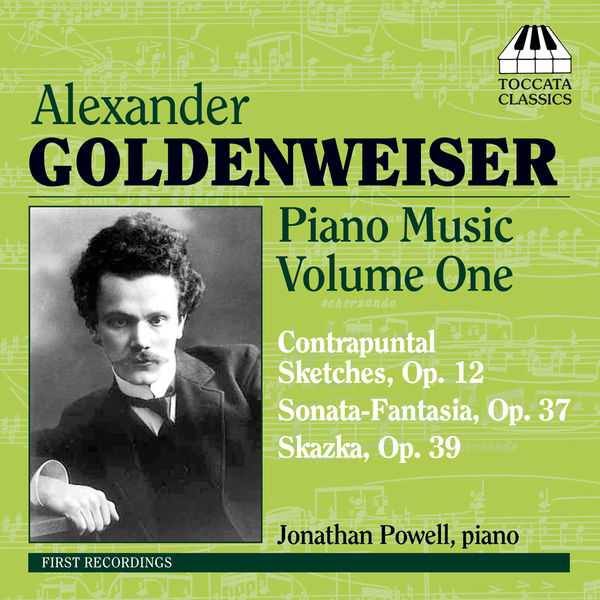
Composer: Alexander Goldenweiser
Performer: Jonathan Powell
Format: FLAC (tracks)
Label: Toccata
Catalogue: TOCC0044
Release: 2008
Size: 254 MB
Recovery: +3%
Scan: cover
01. Skazka (Folk Tale), Op. 39
02. Sonata-fantaziya, Op. 37
Kontrapunkticheskiye eskizi (Contrapuntal Sketches), Op. 12
Book I
03. No. 1, Prelude in C Major
04. No. 2, Fugue in C Minor
05. No. 3, Canon in D-Flat Major
06. No. 4, Prelude in C-Sharp Minor
07. No. 5, Fugue in D Major
08. No. 6, Canon in D Minor
09. No. 7, Prelude in E-Flat Major
10. No. 8, Fugue in E-Flat Minor
11. No. 9, Canon in E Major
12. No. 10, Prelude in E Minor
13. No. 11, Fugue in F Major
14. No. 12, Canon in F Minor
Book II
15. No. 13, Prelude in F-Sharp Major
16. No. 14, Fugue in F-Sharp Minor
17. No. 15, Canon in G Major
18. No. 16, Prelude in G Minor
19. No. 17, Fugue in A-Flat Major
20. No. 18, Canon in G-Sharp Minor
21. No. 19, Prelude in A Major
22. No. 20, Fugue in A Minor
23. No. 21, Canon in B-Flat Major
24. No. 22, Prelude in B-Flat Minor
25. No. 23, Fugue in B Major
26. No. 24, Canon in B Minor
Alexander Goldenweiser was one of the great founders of the “Russian Piano School,” a tirelessly dedicated pedagogue who helped establish the very system of teaching piano in Russia that led to a number of successful, even legendary, concert artists. History often automatically remands the musical compositions belonging to those who teach to the historic dustbin of “those who can’t” (i.e., compose music that goes beyond the rudimentary requirements of finger training). This is despite the fact that Franz Liszt, Ferruccio Busoni — even Johann Sebastian Bach — were all highly regarded as great teachers in addition to their welter of compositions and proficiency at the keyboard. While there was a lengthy pause in the middle of Goldenweiser’s career in which he composed little or nothing, at either end he wrote quite a bit of music but did not do much on his own behalf to promote a reputation as a composer. Pianist Jonathan Powell, a former student of Goldenweiser’s student Sulamita Aronovsky, has decided to pick up Goldenweiser’s cudgel for him in recording Toccata Classics’ Alexander Goldenweiser: Piano Music, Vol. 1.
What is striking at the outset is that all of this music is first-rate from the first note. One might expect Goldenweiser, a student of Taneyev and close friend to Medtner, Rachmaninoff, and Scriabin who lived until 1961, to compose with success in a style decidedly already passé, in keeping with the tradition represented by his associates. In stark contrast to such expectation, there is nothing nostalgic or reactionary about Goldenweiser’s music; it represents a unique and individual line of development from the established tradition to which he belonged and sounds totally fresh and new within such context. Not that one cannot associate it with familiar trends; Skazka, Op. 39 (1961), obviously is a tribute to Medtner, who developed the form of the Skazka, or Fairy-Tale. However, one can sense in Goldenweiser’s harmonic preferences a common bond between Medtner and the approach of Goldenweiser’s own student, composer Nikolai Kapustin. The Sonata-fantaziya, Op. 37, (1959) bears traces of the impact of Scriabin’s Piano Sonata No. 2 in G sharp minor, Op. 19 (1897), but filtered through a much tougher harmonic profile than was Scriabin’s in the 1890s. Most striking is the Contrapuntal Studies, Op. 12 (1932), a collection of very short pieces in all the major and minor keys and thought to be the first such set produced by a Russian composer. These demonstrate Goldenweiser’s canonic mastery and pianistic brilliance, and yet they share some common ground with Busoni and the work of another Goldenweiser pupil, Samuel Feinberg.
Missing links abound in Goldenweiser’s music, and one wonders if he hadn’t worked a little harder on its behalf if posterity might not have considered the value of it more highly than has been the case heretofore. As it is, Goldenweiser’s music is completely unknown, but certainly ripe for rediscovery. Powell makes an excellent case for it; his playing is clean and respectful, generously expressive in the more romantically styled pieces, yet lithe, tart, and succinct in the Contrapuntal Sketches. Hopefully, this series will go far beyond the Vol. 1 indicated here; with the appetite whipped up with the highly engaging and illuminating statement made by Goldenweiser’s music, it makes one hungry for the full course.
Alexander Goldenweiser (1875-1961) is remembered as a major pianist, one of the founders of the Russian school of playing, and a friend of Rachmaninov, Scriabin and Tolstoy. He was also a prolific composer but rarely played his own works in public. His Contrapuntal Sketches, written in the early 1930s, are probably the first Russian cycle of polyphonic pieces encompassing all the major and minor keys; they fuse Goldenweiser’s compositional and pianistic virtuosity with an empathy for Russian folksong. The Sonata-Fantasia presents other, contrasting facets of his complex personality: although demonstrating his link to the Russian Romantics, it is resolutely modern and original. Jonathan Powell studied with one of Goldenweiser’s students, Sulamita Aronovsky.